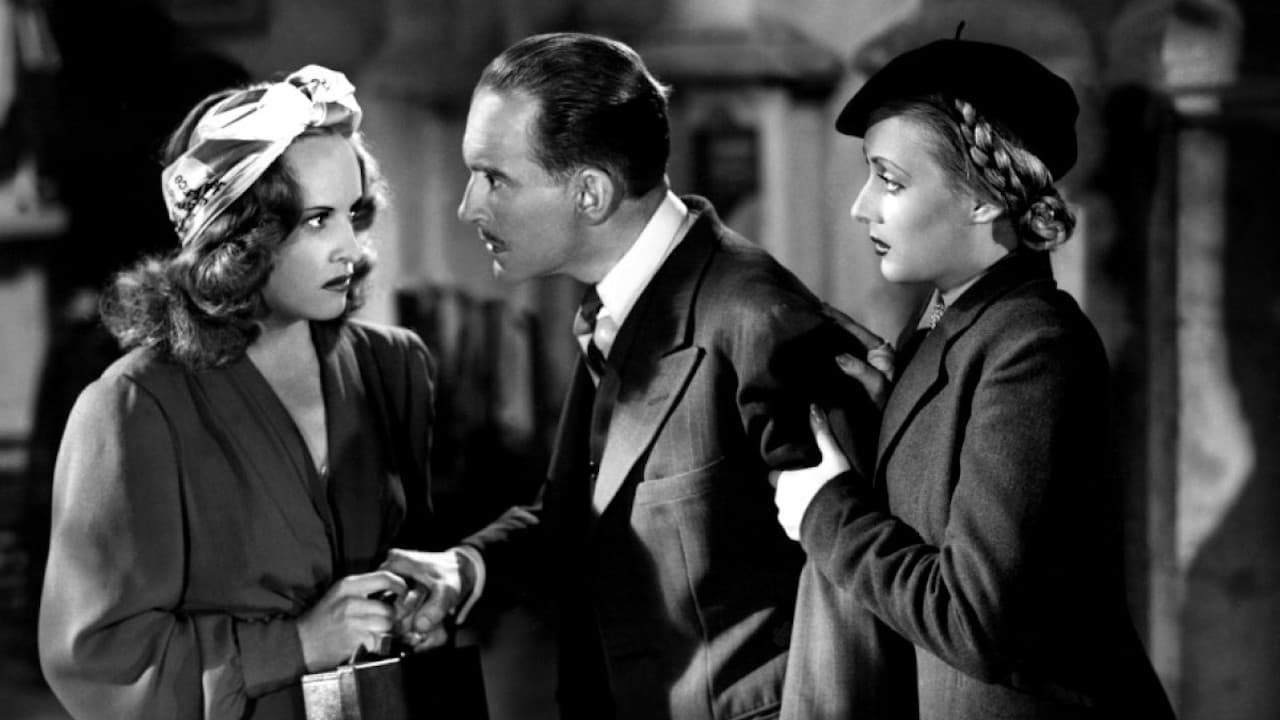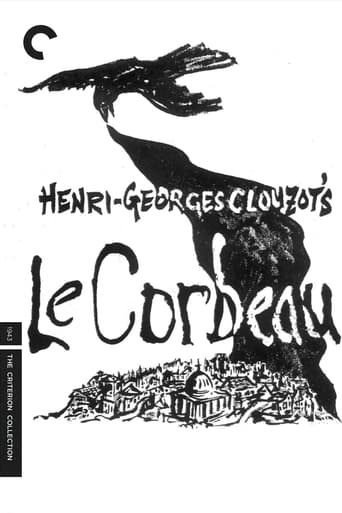

Powerful and involving with a solid cast, Clouzot has a very firm hand on this one as we race from incident to incident and character to character. Splendid Blu-ray print belies the film's considerable age and allows us to enjoy this seemingly simple tale that becomes more and more complex. Nasty, accusatory anonymous letters fall like confetti in this small French village , that the opening advises us, could be anywhere. No doubt that it is France though and with the Germans in occupation at the time Clout is careful not to be too explicit but his upset and anger is certainly evident. Always interesting the final half hour becomes a whirlwind of emotions and activity as we change our minds several times as to who we consider the perpetrator.
... View MoreIn French, the 'crow' is a bird reference defining an anonymous letter sender, generally, poison pen letters, meant to denounce someone or to threaten him. Henri-George Clouzot's "The Crow" is based on a true story that occurred in Tulle, in 1917, a small town in the middle of France. Albeit the origin is true, "The Crow" takes place in a small town "like any other", anywhere in France, it couldn't occult the fact that the practice became very popular during the German occupation, when many French people, claiming to be 'good citizens' or only making their duty, denounced Jews, resistant or relatives to the local Police. "The Crow" was released in 1942, during the occupation, like another French masterpiece "Children of Paradise", but while the context hardly impacted the content of Carné's film, it would be difficult to overlook it for Clouzot, a controversial practice for a controversial time.The film opens with Docteur Remi Germain (Pierre Fresnay) a no-nonsense hardly smiling man, an unusual choice for a lead but another proof that Clouzot is beyond archetypes. Germain doesn't like children but lives in a school director's house, which is not his first paradox, he's very professional with his patients yet indulge himself to some displays of friendship with the beautiful Laura Vorzet (Micheline Francey), the wife of the elderly psychiatrist doctor, played by Pierre Larquay. Laura's sister, an unpleasant and unattractive nurse suspects something going between them and shows it through her constant hostility toward Germain. To complete the picture, the school director's daughter Denise (Ginette Leclerc) and town's slut, is in love with German but can't stand the way he ignores her. In ten minutes, we are familiar with most of the protagonists and the range of suspicions is very wide as soon as the first of the several anonymous letters turn the peaceful town's life into a terrifying witch hunt. The letter accuses Germain of practicing abortions and having illegitimate relations with the doctor's wife. Anyone could have written it as suggests one of the film's most delightful scene. The sympathetic Larquay, remarkably contrasting with Fresnay's coldness, enumerates all the possibilities: it could be anyone. Then, before he leaves, Fresnay asks him the question that tickles our mind: "for all we know, it could be you", to which the doctor responds "possible", as a mystery the film has a sort of Agatha Christie feeling. When everybody is suspect, there are chances not everyone would be truly 'innocent'.And then we touch the controversial core of the film. Clouzot has often been blamed for portraying unsympathetic characters, I won't be the devil's advocate, but I guess I understand why this criticism is often expressed. Clouzot has an extraordinary talent to explore the darkest sides of the human soul: jealousy, envy, greed, lust and much more hypocrisy. Remember Jo in" Wages of Fear" playing tough during the first act before revealing his cowardice, in "The Crow", people are not unsympathetic, but the letters that denounced them awaken defensive and egoistical reactions. "The Crow" is built like a mystery but resonates like a profound and subversive commentary of the methods and practices that prevailed and that inspired the worst from good citizens.Yet the ambiguity remains because while everybody is suspect, everybody is also victim of these accusations when letters start being sent to all the population, when everyone is both an accuser and accused. The cheaters, the cuckold, the sluts, the upstarts, they're all denounced, and sometimes the subject is treated with less gravity and more comedy, like when the Postmaster takes a letter for his wife, a gesture that doesn't fool his employees. The Crow opened a Pandora box that can be paralleled with the presence of Germans in France, with the growing paranoia and suspicion effect applying to everyone. "The Crow" even shares a similarity with the Nazi's black eagle, a bad omen for the population. But even this conclusion is debatable, the Occupation is never mentioned, the story could take place in the mid 30's as well, but it was considered Anti-French, in the way it was vilifying the population, but Anti-French in the 40's can be a good reason to see it with more positive eyes a few years later. Except Clouzot produced it with a German-owned company, and the film features an unforgettable scene set in a classroom, when Dr Larquay swings a lamp that lights a globe, putting light and shadow in different parts of the room, in order to expose the ambivalence of the world, what is exactly right, or what is wrong is a matter of perception. This kind of cynical speech can also serve as an alibi for the detractors until the very ending of the film gives another resonance to the scene. As usual with Clouzot, the most memorable moments of his films happen to be the most controversial. And the controversy surrounding "The Crow" is understandable as long as it doesn't overlook the remarkable direction of the film that transcends the intelligence and subversiveness of its screenplay, foreshadowing more great movies to come. Henri-George Clouzot also demonstrates his unique talent with moves about everyday people trapped in extraordinary situations: doctor, magistrate, cops, housewives, teachers, janitors. Pierre Fresnay, the Captain from "Grand Illusion" is again perfect as the doctor Remi Germain but the scene-stealer remains Larquay with his inimitable voice and intelligent analysis and Ginette Leclerc as a good-hearted and femme fatale-like Danielle. I use the word because the film has often been labeled as the first film noir of French cinema along with "Quai des Brumes", maybe it is true in the way it echoes the 'darkest' and most inclined to pessimism period of French history, it makes "The Crow" even more historically and culturally significant anyway.
... View MoreAn odd but tremendously potent mix of a 'quiet' non-violent but very tense noir thriller, a deeply dark humored, sometimes blackly comic look at human nature, and a political tale of moral hypocrisy in a small town.By the end I was riveted, moved and provoked. I was even more impressed when I learned more about the history of the film. Made while France was under occupation by the Nazis, the theme of neighbor turning against neighbor takes on an even deeper and more chilling context. A film with no hero and many villains, it is challenging, well acted and physically beautiful. How sadly ironic that film-maker Clouzot was castigated after the war for being a Nazi collaborator for making the film under the thumb of the Nazis (who, of course, controlled the French film industry at the time), when this is about as clearly an anti-collaborationist film as one could imagine. I'm amazed the Nazis didn't stop it's release, much less that they financed it. This is truly subversive cinema at its finest.
... View MoreI fell in love. This film is so damn good it hurts, especially compared to the majority of English language films of the '40s.It's difficult to add much to the comments already made on this classic film (without writing a book on it), and I agree wholeheartedly with the praise it receives.The cinematography is beautiful, the writing is sharp and tight, the cast is superb and from beginning to end it's gripping and intense.I seem to have reacted differently to many on one point, however. Reading through the other comments, I see a plethora of words like dark, misanthropic, disturbing, grim, depressing....Personally, I spent much of this film chuckling to myself (quietly, so I didn't miss a single line of dialogue), gleefully revelling in the wonderfully mordant comedy which lurks just beneath the surface.Does it really present a negative view of people? I would say not. The film states emphatically, over and over, that everyone has faults and flaws.Denise sleeps around. Laura want to, but can't. Rolande misappropriates funds from the post office. Marie Corbin filches morphine from the hospital. Rémy, our protagonist, is an abortionist (and in a Catholic country to boot!).Town officials fill their pockets, drink and doze and dally while they should be working, have affairs and act... like humans.Not evil - flawed. Denise want to be respected. Laura wants to be loved. Rolande wants to live the good life. Marie is fiercely loyal. Rémy is a passionate doctor who acts according to his beliefs.To me, not even "le Corbeau" himself was wholly evil. Vorzet's actions are certainly evil, and their results tragic and catastrophic, but his insanity is pointed out as coolly as the foibles of the other characters. By the good doctor himself, which is a nice touch... one which made me laugh at the end, looking back on the jovial commentary he provides throughout the film.The humour is certainly on the dark side - and somewhat obscured by the emotional impact of the characters and the impetus of the story - but I found that at the heart of the film's darkness is a fundamental affirmation that life is a complex tapestry of good and bad, selfish and altruistic.Nobody is all good or all bad. I honestly believe that. To say so isn't misanthropic or negative - it's just a fact. Neither does such a view condone selfish or destructive behaviour; rather, I would say, it implies a degree of awareness (whether observational or personal) which is more likely to discourage than encourage.After all, if a person doesn't see their own faults, how can they deal with them? Compared to many films (not just of its own era), this is a morally complex tale. It treats all of its characters - from Rémy Germain and "la mère du cancéreux" to Vorzet himself - with a delicacy and sympathy which is unusual and moving.The fact that it's also bitingly satirical and viscerally intense... well, that's just a bonus!
... View More